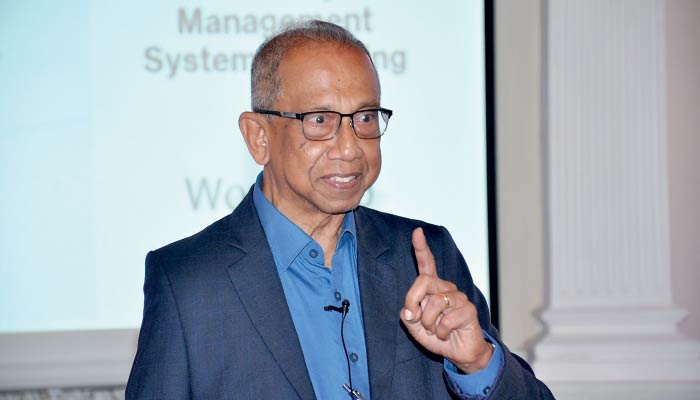Tuesday Feb 24, 2026
Tuesday Feb 24, 2026
Thursday, 30 October 2025 05:33 - - {{hitsCtrl.values.hits}}


ContinuityNZ Director/Principal Consultant Nalin Wijetilleke
By Amira Cader
As Sri Lanka grapples with an estimated $ 450 million to $ 1 billion in annual losses due to cybercrime, leading experts and diplomats have called for stronger awareness, vigilance and governance to counter the growing digital threat landscape.
The warning came during the “Mastering ISO 27001 Auditing” workshop held at the Taj Samudra Colombo yesterday, organised by HLB Lanka Business Advisory. The program aimed to build capacity among Sri Lankan professionals to strengthen internal audit systems and align with global standards in information security management.
Conducted by ContinuityNZ Director /Principal Consultant Nalin Wijetilleke, the workshop offered hands-on training on effective ISO 27001:2022 implementation, risk-based auditing and integrating compliance with Sri Lanka’s Personal Data Protection Act (PDPA).
Wijetilleke – an ISACA Hall of Fame Inductee and multi-award-winning international governance, risk and cybersecurity professional — underscored that information security must now be viewed as a strategic business enabler, not merely a compliance requirement.
“The cost of cyber incidents goes beyond financial loss — it damages trust, reputation and business continuity,” he said.
“By embedding a culture of vigilance, accountability and continuous improvement, organisations can transform compliance into confidence,” He further added.
New Zealand’s High Commissioner to Sri Lanka and the Maldives David Pine echoed this sentiment, stressing the importance of education and shared responsibility in addressing cyber-risks.
“Cybersecurity awareness is the first line of defence. Every organisation and individual must understand the value of the data they handle and the consequences of a breach. A well-informed society is a safer one, reaffirming proper commitment to strengthening regional digital resilience initiatives,” Pine said.
The workshop was further distinguished by the presence of New Zealand High Commissioner to Sri Lanka David Pine who graced the opening ceremony as the chief guest, highlighting the significance of cross-border collaboration in advancing information security practices.
Pine echoed this sentiment, stressing the importance of education and shared responsibility in addressing cyber risks.
“Cybersecurity awareness is the first line of defence. Every organisation and individual must understand the value of the data they handle and the consequences of a breach. A well-informed society is a safer one, reaffirming proper commitment to strengthening regional digital resilience initiatives,” he added.
According to Asian Development Bank (ADB) Digital Sector Office Director Antonio Zaballos, Sri Lanka’s annual cybercrime losses could reach $ 1 billion, signalling the urgent need for professional training, regulatory alignment and stronger governance frameworks.
The workshop also highlighted the global role of ISACA, the international professional association for IT governance and cybersecurity, which today boasts 231 chapters in 90 countries and a membership of over 170,000 professionals worldwide. ISACA’s global network continues to drive best practices in information systems auditing, cybersecurity and risk management across industries.
Also present at the event were Cargills Bank Chief Manager – Information Systems Audit Amitha Munasinghe, Eguardian VP Technology Evangelist Lakmal Embuldeniya, and HLB Lanka Business Advisory Partner – Technology Advisory and Chief Information Officer Lahiru Livera.
The workshop concluded with a call for Sri Lankan organisations to adopt international standards like ISO 27001 as part of a broader strategy to safeguard data, maintain trust and ensure business continuity and by bringing together professionals from the public and private sectors, the event reinforced that cybersecurity is no longer a technical issue but a strategic imperative essential for ensuring trust, resilience and long-term business sustainability in Sri Lanka’s digital economy.
Pix by Lasantha Kumara